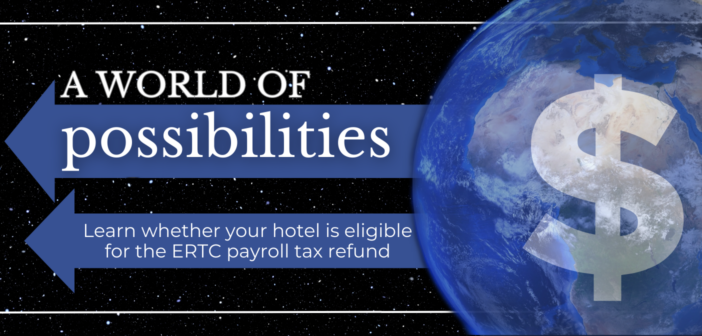Is your hotel eligible for the ERTC payroll tax refund?
Here’s what you need to know
by MIKE GROSBERG
Government-mandated lockdowns during the first two years of the pandemic had a profound impact on small businesses — and the effects were most visible in the hospitality sector. Hotels exist to facilitate in-person gatherings, events, and travel. With those activities severely curtailed for public safety reasons, hotels were left scrambling to find new revenue streams and support their workforces.
That’s why Congress enacted the Employee Retention Tax Credit (ERTC), a relief measure for eligible employers who kept workers on the payroll despite the hardships their businesses experienced throughout the pandemic. The ERTC allows small businesses, including hotels, to apply for refunds on their payroll taxes – up to $26,000 per employee. This means hotels can potentially receive significant financial support to cover payroll and other expenses during this time of high inflation and rising wages caused by the pandemic.
The ERTC allows small businesses, including hotels, to apply for refunds on their payroll taxes – up to $26,000 per employee.
The ERTC is administered by the IRS. As with other IRS forms, the paperwork required to submit an ERTC claim is complex and time-consuming. And, while the effort is worthwhile for many hotel owners, it requires meticulous documentation that’s challenging to navigate. To ensure you meet IRS eligibility requirements and submit a complete, accurate application, you’ll need to consider engaging a business consultant or advisor who can help you obtain the funds to which you’re entitled while avoiding unnecessary complications.
DO HOTELS QUALIFY FOR THE EMPLOYEE RETENTION TAX CREDIT?
There are two conditions that qualify hotels and other small businesses for the ERTC. You must meet at least one of them to be eligible to receive a payroll tax refund:
- Your business had to partially or completely suspend operations due to government-imposed COVID-19 restrictions.
Real life example: A government mandate in your state severely limited group gatherings, requiring you to postpone weddings and other events booked for your on-site venue.
- Your business experienced a substantial revenue decline in comparison to 2019, either throughout 2020 or in the first three quarters of 2021.
Real life example: A state mandate halted all non-essential business travel for meetings and trade shows, causing a rush of cancellations and significant revenue losses.
FINDING AN ERTC PARTNER OR CONSULTANT TO HELP WITH YOUR APPLICATION
Many small business owners turn to their tax preparers or accountants for ERTC support and advice. But, while these professionals can provide necessary payroll records, they’re usually not equipped with the resources to confirm whether your business experienced a partial suspension of operations, let alone which of the thousands of government orders caused the impact. They’re also not likely to be prepared to execute the complex calculations or gather the documentation required to assemble a robust ERTC application.
Instead, consider engaging a reputable firm with a strong track record of helping similar hotels, event venues and hospitality providers determine their eligibility and file for the ERTC. A reliable advisor will have the financial expertise to accurately determine your refund amount and retain CPAs to sign off on documents. Ask questions about the systems they have in place to protect your sensitive data (a secure SOCII database is recommended) and expect them to demonstrate how they plan to keep you in the loop about status updates on your claim.
When searching for the right partner, be wary of bad actors. The IRS has issued a warning about tax credit mills that take advantage of businesses by not doing the due diligence to determine their clients’ eligibility, which can lead to delays, hurdles, and potentially missing out on the refund altogether. However, these bad actors aren’t unique to the ERTC program and shouldn’t prevent you from working with a reputable consultant to evaluate your eligibility.
BE MINDFUL OF THE TIMELINE TO APPLY – AND GET STARTED EARLY
The deadlines to submit ERTC applications are staggered, with claims for 2020 payroll taxes due on April 15, 2024. Claims for 2021 are due on the same date, one year later. Given the time-consuming nature of the filing process, it’s best to begin assessing your eligibility as soon as possible.
Two years after the height of the pandemic, the ERTC is providing independent hotel owners with funds that enable them to expand and retain their workforce during challenging economic conditions. Don’t wait to claim the funds your business is entitled to.
 Mike Grosberg is president of Boston Growth Partners (BGP), a management consulting firm that helps middle-market businesses drive growth, which he has led since 2018. Prior to BGP, his career spanned consulting and C-suite roles with both emerging ventures and global Fortune 100 enterprises. His expertise covers manufacturing, distribution and global supply chains in a variety of industries. He earned his CPA in 1996 and worked as a Big 4 auditor.
Mike Grosberg is president of Boston Growth Partners (BGP), a management consulting firm that helps middle-market businesses drive growth, which he has led since 2018. Prior to BGP, his career spanned consulting and C-suite roles with both emerging ventures and global Fortune 100 enterprises. His expertise covers manufacturing, distribution and global supply chains in a variety of industries. He earned his CPA in 1996 and worked as a Big 4 auditor.




